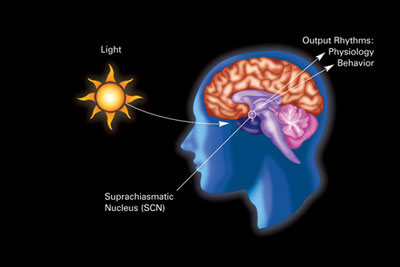Image by: YassineMrabet
Breakfast is finished. There are a million things to do before heading out the door. On the corner of the place-mat is a collection of shapes (oblong, round, oval) and colors (white, peach, gold, green). Grab and swallow. It is very nearly a reflexive act.
You recognize the importance of taking vitamins, minerals, and other dietary supplements. You spend significant funds on these products. Taking them is a morning ritual. You want them to boost your immune system, to be available for regular cellular repairs, to help moderate stress, and to prevent future catastrophes like heart disease and cancer. Chronobiology may help you optimize the benefits offered by vitamins, minerals, and other supplements.
Chronobiology, the study of biological rhythms, has made significant findings about improving medical treatment based on timing. Cancer researchers are at the forefront of studying the correlation of treatment with biological rhythms. For example, in premenopausal women, when undergoing surgery for breast cancer, where the woman is in her menstrual cycle has a significant impact on the probability of a future significant recurrence of the cancer. Women that have their breast cancer surgery scheduled during the luteal phase of their menstrual cycle have a much better prognosis for recovery and survival than women who have surgery during the follicular phase. Interestingly, mammography does a better job of detecting cancer during the follicular phase. Other interesting chronobiology effects include a higher rate of breast cancer in women with disrupted circadian rhythms due to working night shifts. There is evidence that timing the administration of chemotherapy and other drug treatments for cancer patients has a significant impact on their effectiveness. Also, proper timing helps reduce the toxicity associated with these treatments. Improved effectiveness based on timing is not limited to cancer treatments. Taking ACE inhibitors (used for the treatment of hypertension and congestive heart failure) at night, improves the performance of this class of drugs and reduces the incidence of negative side effects.
Providing your body with access to supplements on a daily basis is a good first step, but optimizing the effectiveness of these supplements requires factoring timing into the equation.
Biological rhythms or phases were first recognized in plants. Many plants exhibit strong circadian rhythms. In certain plants, this can be readily observed with their flowers opening up at regular times during the day. This behavior is consistent enough that Carolus Linnaeus planned a garden of various plants that could be used to tell time throughout the day based on which flowers were open.
At the most basic level, there is a dark – light cycle, with cells and organisms performing certain functions during the daylight hours and other functions during darkness. At the cellular level, it is believed that photosensitivity arose as a method of protecting replicating DNA from harmful ultra-violet rays. At the macro or organism level, the human circadian rhythm follows a dark – light cycle. The mechanism for this appears to be a circuit from the retina of the eyes, where photoreceptive ganglion cells collect information, then transfer this data to the Suprachiasmatic Nucleus. The Suprachiasmatic Nucleus processes the data from the retina and provides corresponding information to the pineal gland for the release of melatonin. Secretion of melatonin commences with the onset of the dark cycle and ebbs during daylight. In healthy adults, the periodicity for the human circadian rhythm is quite strict, measured at 24 hours and 11 minutes (with an error of +/- 16 minutes).
Image by: National Institutes of Health
This basic division between dark and light serves as a good starting point for our efforts to supply our body with vitamins, minerals, and other supplements at the most effective times.
There are two types of vitamins, water soluble and fat soluble. Water soluble vitamins include the B vitamins and vitamin C. Fat soluble vitamins include vitamin A, D, E, and K. Fat soluble vitamins are absorbed through the intestinal tract with the aid of lipids. For maximum effectiveness, they must be taken with a meal that contains some fat (a point bacon lovers may want to keep in mind). Water soluble vitamins as the name implies require water to be absorbed properly. Thus, taking both types of vitamins with food and drink is recommended.
Given the need to take vitamins with a meal, we can use an AM / PM pill divider to separate our supplements to take with breakfast or dinner. The known effects of the supplement help us determine whether to take it with a morning or evening meal. For example, B vitamins give you energy and protect against stress, so we will want them hitting our system first thing in the morning. On the other hand, the mineral magnesium tends to cause sleepiness. This would be a good one to take in the evening. With these concepts in mind, I worked out the following schedule for taking my vitamins, minerals, and other supplements.
AM:
—B vitamins (Biotin, Folic Acid, Niacin, Panothenic Acid, Riboflavin, Thiamin, B6, and B12) are associated with improved energy and protecting the body from stress. Unless I need to be awake at night, I take my B vitamins with my morning meal.
—Vitamin C – I take vitamin C both in the morning and the evening.
—Vitamin D is naturally produced from exposure to the sun, thus making this supplement available during daylight hours seems logical.
—Multivitamins – Because they contain B vitamins, I take my multi with a morning meal. Also, because they contain fat soluble vitamins, such as Vitamin A, I make sure that I have some fat with my breakfast, usually whole milk yogurt. (Note: If taking calcium supplements and your multi contains iron, then you will want to take your calcium at a different time, as it can interfere with iron absorption. Also, iron can interfere with the absorption of zinc, so best to take your zinc supplement at a different time.)
PM:
—Magnesium is known to induce sleepiness, making this an obvious candidate for the evening meal.
—Zinc has also been known to induce sleepiness and lethargy, so I take it in the evening.
—Vitamin C – I particularly like vitamin C in the evening, because it helps to minimize follow-on muscle soreness from a hard work out.
—Vitamin E with its vasodilating effects and relationship to heart health would seem to be best taken in the evening.
—Essential Fatty Acids (Flax Seed or Fish Oil) are also associated with heart health. Their ability to help with inflammation also indicates to me that there may be a benefit to taking them at the end of the day.
—Coenzyme Q-10 also falls into the category of supplements that are associated with heart health, so I take it in the evening. It is also fat soluble and best if taken with a meal that includes some fat.
—Melatonin is released at night. Melatonin supplements can be taken in the evening as a sleep aid or to speed up recovery from jet lag.
You want to give your body the best opportunity to get the most out of your supplements. In life, timing is everything. So, do not be afraid to experiment with the times that you take your supplements. You may just find that you can optimize the health benefits of vitamins, minerals, and other supplements by changing the times that you take them.










Did you find anything out about ginkgo biloba?
Eileen
Eileen:
*Here is a link to the NIH’s National Center for Complementary and Alternative Medicine and their info about Ginkgo Biloba.
*Ginkgo has been touted as a supplement that helps prevent memory loss due to aging and also prevents the onset of age related dementia and Alzheimer’s. Unfortunately, NIH’s Ginkgo biloba Evaluation for Memory study did not show any significant decrease in the rate of dementia or Alzheimer’s based on Ginkgo use.
*Many people report that Ginkgo helps improve concentration. This may be a result of increased blood flow, one of the effects of taking Ginkgo.
*Others report that taking Ginkgo before bed results in more vivid dreams. I have noticed this myself, when taking Ginkgo before bed.
*There are lots of other positive reports about the use of Ginkgo for example it has anti-oxidant properties, helps control allergic inflammation and asthma, and can be used for the treatment of sexual dysfunction. Presently, Ginkgo is one of the most popular herbal supplements in the US.
*Given its propensity to increase blood circulation, this is a supplement that I would experiment with in the evening category.
*Interesting discovery of a gene mutation that appears to allow a mother and daughter to function properly with less sleep.
http://www.npr.org/templates/story/story.php?storyId=111845909
Pingback: Thursday 7/28/11 | Derby City CrossFit - Louisville, KY
Does anyone know what could be a good B12 supplement? Some of my friends recommend http://products.mercola.com/vitamin-b12-spray/ Has anyone tried it?
I have not. If you do go that route, please let us know about your results.
I was just thinking of Hazel the other day, woneirdng how she was doing. Always a classy lady and fun to be around. My thoughts and prayers are with you all. She will be greatly missed.